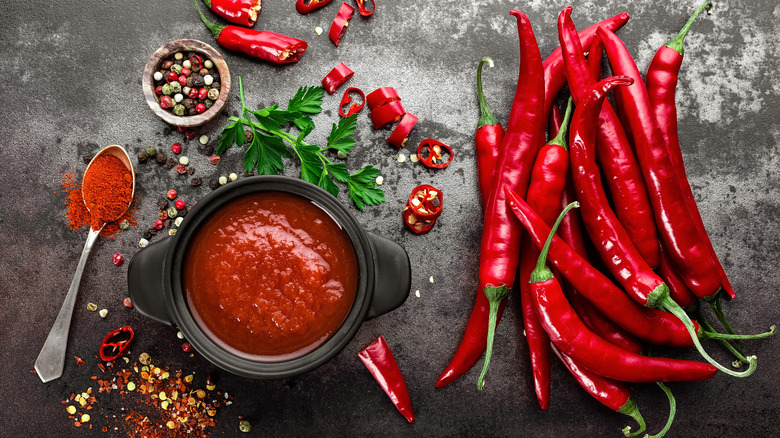Do Fermented Hot Sauces Taste Different Than Ones Made With Vinegar?
Hot sauce goes on everything. There are dozens of different kinds of hot sauces. Each provides a necessary flavor to recipes for chili, steak marinades, and chutney, while also being the ideal condiment for sandwiches, pizza, potatoes, tacos, and more. We wouldn't have hot sauce today without the chili pepper, which is native to Central America. According to African Dream Foods, the Aztecs were believed to be the original curators of the chili, cultivating them as far back as 7000 B.C. The ancient civilization ground the chilies with water and other herbs to spice up their foods and to make medicines.
We can all agree that the creators of the first hot sauce deserve a huge shout-out. We also owe a debt of gratitude to the hot sauce makers of today who bring unique flavors to our favorite meals. Hot sauces today are defined and differentiated from one another by various factors, including heat levels, acidity, color, and so on. However, another way that we can compare hot sauces is by looking at the way they are made. Two of the most common ways hot sauces are made are by fermentation or by being mixed with vinegar. Each method has its own flavor profile and benefits for hot sauce connoisseurs.
Coming in hot!
So, what's the real difference between fermented and vinegar hot sauce? Pepper Scale claims that fermented hot sauce is created by taking a chili pepper mash and soaking it in a salt brine for several days. That sounds simple enough, but vinegar-based hot sauce is even easier to make. Creating vinegar-based hot sauce simply entails combining a pepper mash with vinegar (with your preferred ratio). Unlike fermented hot sauce, the vinegar kind doesn't need to age and can be used immediately.
While fermented hot sauce takes longer to make, there are some additional benefits to making fermented sauce. According to Sandia Seed, fermented hot sauce has a lot more nuance and complex flavors. There is a natural tangy flavor that can only be achieved through fermentation and the process also lends probiotics to the mixture, which are good for the gut. Fermented hot sauce is also good at bringing the heat, while also not letting the spice factor overwhelm the actual taste of the pepper. As for the vinegar-based hot sauce, Bon Appetit says that fan favorites like Crystal, Frank's RedHot, and Tabasco are all fantastic examples. Vinegar-based hot sauces tend to be as acidic as they are spicy and also tend to have a bright sharp flavor balanced out with the heat of the chili.

